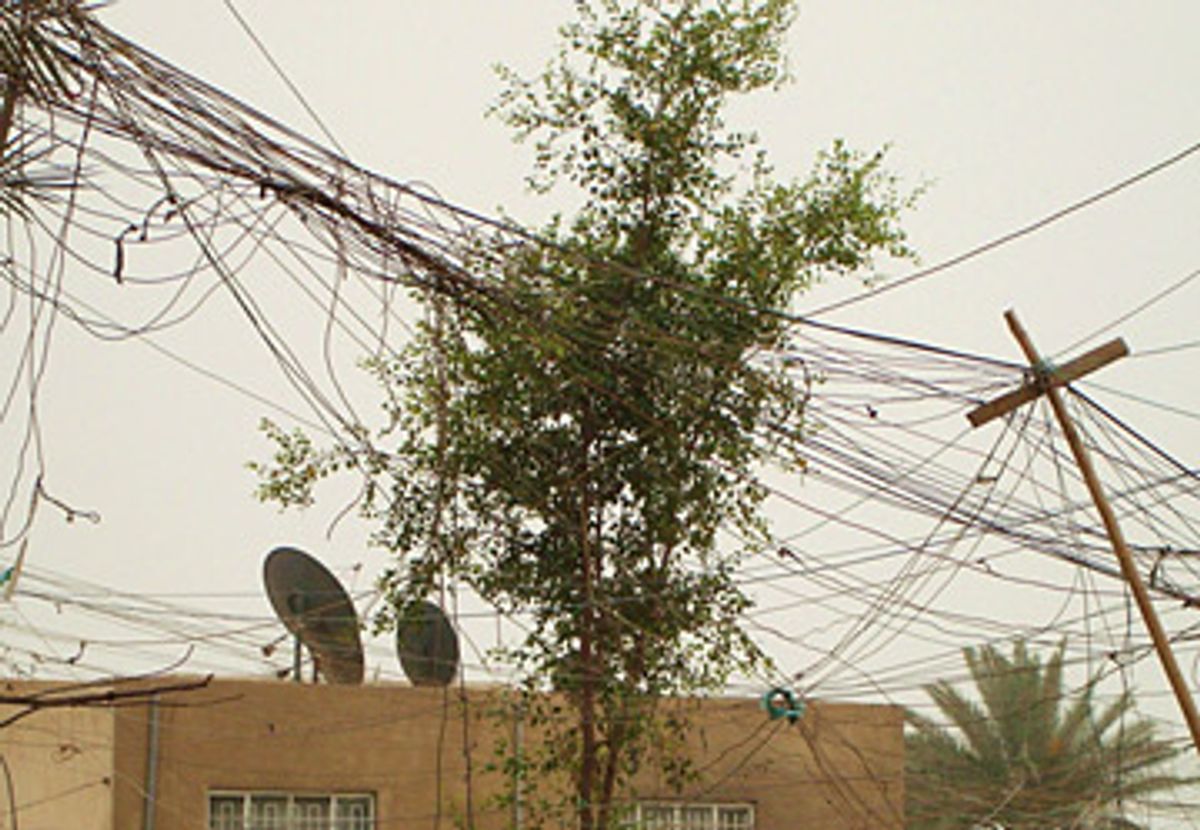May 19: The most important man on Twenty Third Street in Baghdad's southwestern neighborhood of Risala is Haidar Majli Finjan, a bony, balding man in his 30s who likes to dress in a dirty T-shirt, plastic flip-flops and gym pants he rolls up to his knees.
Finjan gives local residents what no one else apparently can: electricity.
Finjan is the owner and operator of a street generator, hundreds of which have sprung up on Baghdad's street corners since the war decimated whatever crippled power grid the Iraqi capital had before 2003. The government power lines feed between zero and four hours a day of electricity to Risala's homes, usually closer to zero. Finjan's generator feeds seven.
His services are expensive. The electricity the government is supposed to provide but doesn't costs next to nothing. The 150 or so households hooked up to Finjan's generator pay between $35 and $65 a month. This is more than most families in a city where the average income hovers around $200 a month can comfortably afford. But they also cannot comfortably afford to let their food go bad in unplugged refrigerators. Seven hours of power a day is just enough to keep most things in the fridge from spoiling, one American civil affairs officer told me.
Every time American troops patrol the streets they hear the same refrain from the Iraqis: There is no electricity. This frustrates the Americans, who say it is the Iraqi government's responsibility to rebuild the infrastructure. Military officials say that bringing electricity to the streets of Baghdad will improve security -- if only because the safety of a brightly lit street will encourage entrepreneurs to keep their businesses open later, and hire the scores of unemployed men who otherwise become perfect candidates to emplace roadside bombs on behalf of sectarian militias.
The catch is that the Iraqi government, citing security concerns, refuses to bring power and other basic services to areas where these militias operate. And so thousands of Baghdad's residents either rely on the prohibitively expensive services of people like Haidar Majli Finjan, or try to survive in the dark, with nothing to power their air conditioners and fans in the 105-degree heat.
May 18: It is 7:30 a.m. and I am sweating in the back of a Bradley fighting vehicle with an Iraqi translator nicknamed Xzibit, a 19-year-old wannabe Iraqi rapper who is dozing off across the aisle. We are sitting in the middle of the road in the Shiite militant stronghold of Risala, in southwestern Baghdad, waiting for military contractors to deliver some concrete barrier so that American troops can help the Iraqi police set up a checkpoint. We have been sitting in the sweltering Bradley for about an hour, parked behind two M1 Abrams tanks, where the soldiers are sweating, too.
Through a dusty periscope the size of a coke bottle I try to glimpse life outside the Bradley. If you disregard the macabre scenery, at 7:30 in the morning the Shiite militant stronghold looks like a lot of cities on a weekday morning. There's a woman in a knee-length skirt talking on her cellphone as she gets into a minivan that will take her to work along the street ruined by five years of war and disrepair. There is a group of willowy teenage girls in tight-fitting jeans and bright scarves on their heads stepping around pools of raw sewage as they hurry to school with books under their arms. There is a guy in a striped polo shirt selling petrol from yellowed plastic canisters on the side of the road potholed by roadside bombs: a gas station, Iraq style.
We wait for another 30 minutes or so, until it becomes clear that the contractors will not show up until later in the day. Our convoy pulls forward a few hundred feet, then stops. The back hatch of the Bradley opens, and Xzibit and I get out and follow one of the American soldiers to a bakery.
Few things smell as good as fresh samun bread with a sprinkle of sesame seeds, especially after the diesel fumes of a Bradley. Inside the shop, several young men are rolling the dough, molding it into boat-shaped bread loaves the size of a paperback, sliding them into a wood oven on an enormous wooden spatula, and taking out the loaves that have already been cooked. The shop owner eyes his body armor-clad customers with little enthusiasm.
The bread is eight loaves for a dollar. We buy 104. The loaves are so hot they rip through the flimsy plastic bags, and we have to double-bag them to carry them to the Bradley. The soldier gives the baker a $20 bill, and tells him to keep the change, but the baker gravely counts out $7 in soiled Iraqi dinar. We bring the bread to Combat Outpost Guerrero where about 100 soldiers are stationed, just in time for breakfast.
Back at the outpost, I grab a piece of samun and run into Capt. Sean Chase, the company commander, who was in the turret of the Bradley during our early-morning outing. He is chewing on samun, too. We agree that it is delicious, and that we don't even mind the fact that we had to sit in the Bradley for two hours, waiting for contractors who never showed up.
So what if our shopping required a little extra force protection?



Shares